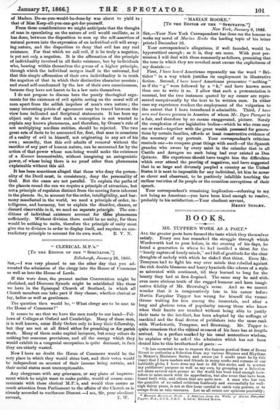" CLERICAL M.P.'s."
[To THE EDITOR OF THE " SPECTATOR.") Edinburgh, January 24, 1866. SIR,—I was very pleased to see the other day that you ad- vocated the admission of the clergy into the House of Commons as well as into the House of Lords.
If this were done, the present useless Convocation might be abolished, and Diocesan Synods might be established like those we have is the Episcopal Church of Scotland, in which all Church members can take part if they choose, whether clerical or lay, ladies as well as gentlemen.
The question then would be, " What clergy are to be sent to the House of Commons ?"
It seems to mo that we have the men ready to our hand—Fel- lows of Colleges at Oxford and Cambridge. Many of these men, it is well known, enter Holy Orders only to keep their fellowship, but they are not at all fitted either for preaching or for parish work. Many of them make capital lecturers, but many others do nothing but consume provisions, and all the energy which they would exhibit in a congenial occupation is quite dormant, in fact they are utterly wasted.
Now I have no doubt the House of Commons would be the very place in which they would shine best, and their votes would be independent on account of their income being certain, and their social status most unexceptionable.
Any clergyman with any grievance, or any plans of improve- ment which he might want to make public, would of course com- municate with these clerical M.P.'s, and would thus ensure as much attention from Parliament to the affairs of the Church as is already accorded to vociferous Dissent. —I am, Sir, your obedient


































 Previous page
Previous page